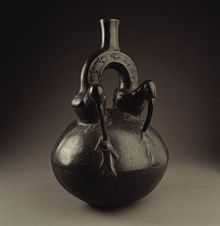Chimor
| Kingdom of Chimor Chimor | |||||
| |||||
 | |||||
| Capital | Chan Chan[1] | ||||
| Languages | Quignam, Muchik family. | ||||
| Government | Not specified | ||||
| King of Chimor | |||||
| - | 900?–960? | Tacaynamo | |||
| - | 960?–1020? | Guacricaur | |||
| - | 1020?–1080? | Ñancempinco | |||
| - | 1440?–1470 | Minchancaman | |||
| History | |||||
| - | Established | 900 | |||
| - | Inca conquest | 1470 | |||
Chimor (also Kingdom of Chimor) was the political grouping of the Chimú culture that ruled the northern coast of Peru, beginning around 850 and ending around 1470. Chimor was the largest kingdom in the Late Intermediate period, encompassing 1000 km of coastline. The greatest surviving ruin of this civilization is the city of Chan Chan located 4 km northwest of the current Trujillo city.


The Chimú grew out of the remnants of the Moche culture. The first valleys seem to have joined forces willingly, but Sican was acquired through conquest. They also were significantly influenced by the Cajamarca and the Huari culture. According to legend the capital Chan Chan was founded by Taycanamo who arrived in the area by sea.
Chimor was the last kingdom that had any chance of stopping the Inca. But the Inca conquest was begun in the 1470s by Tupac Inca, defeating the local emperor Minchancaman, descendant of Tacaynamo, and was nearly complete when Huayna Capac assumed the throne in 1493 AD.
Chimú ceramics are all black. It is also known for its exquisite and intricate metal-working, and one of the most advanced of pre-Columbian times.
References
- ↑ "Chan Chan : Capital of kingdom Chimu - UNESCO". Retrieved 29 March 2012.